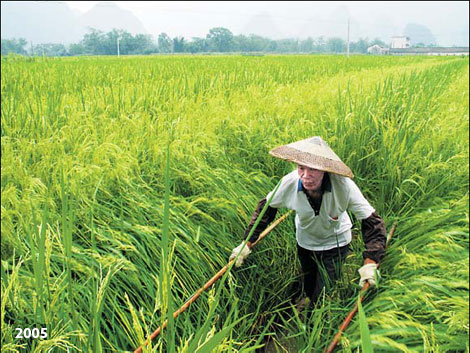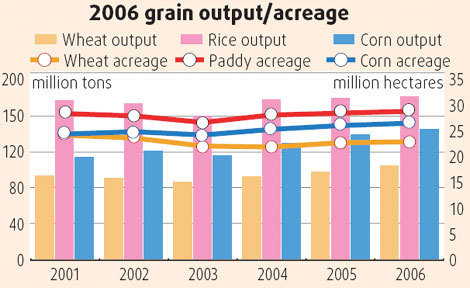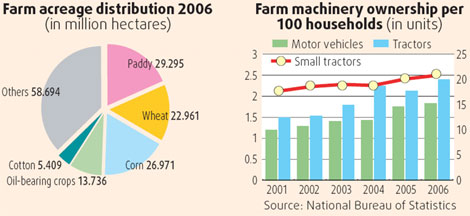|
|
 |
|
30th Anniversary Celebrations
Economic Development
New Rural Reform Efforts
Political System Reform
Changing Lifestyle
In Foreigners' Eyes
Commentary
Enterprise Stories
Newsmakers
Photo Gallery
Video and Audio
Wang Wenlan Gallery
Slideshow
Key Meetings
Key Reform Theories
Development Blueprint
Li Xing:
Teachers like Li need our support Alexis Hooi:
Going green in tough times Hong Liang:
Bold plan best option for economy Endless, ancient toil
By YOU NUO (China Daily)
Updated: 2008-07-14 15:07

The two photos in our column this week have a difference of 20 years - the black-and-white one taken in 1985 while the color one is from 2005. For most economies in the world, 20 years don't usually show much difference. But for Chinese farmers, they are a world apart. Growing rice used to be a family affair, an intensive operation that frequently required at least several people to play different roles. This had been the case for eons (archeologists say people might have grown rice 7,000 years ago in some spots in the Yangtze valley).
But the practice, as we can see from the 1985 photo, lasted well into the 1980s in many parts of the country. From time to time, especially during harvest, the whole family would be working in the fields. Even the young kids were asked to run some errands. There was nothing idyllic about it. For families short of labor, teenagers dropping out of school was almost a matter of course - and the consequences, as can be easily imagined, would severely limit their opportunities to find a life beyond the countryside. Urban-based educators used to wonder, not so long ago, when the farmers could be liberated by machines or by something else, from so much work in the fields, so that their children could go to school and prepare for more creative jobs. A change has become widespread since the beginning of the 2000s. Urban jobs (sometimes disparaged as sweatshop pay in developed countries) have proved so attractive to rural youths that increasing numbers of them are leaving the paddy fields to work in the cities. The scene of a whole family working (and virtually living) in the fields is no longer commonplace. Attending the paddy is more often a lonely operation. Even in busy times, farmers just borrow (they do not usually say "buy") services from each other, in order to harvest the crops, to use farm machinery, and to build irrigation systems. These services are paid in part by the remittances from their children working in the distant cities. So far so good, it seems. But for agricultural specialists, this is by no means a secure system. Farming in China still has a long way to go to become truly modernized and efficient. Feeding more than one-fifth of the world's population still remains a challenge. As can be seen from one of our charts, private ownership of farm machinery is still low in Chinese countryside. And that amount of machine power has sustained the nation's grain output for so long. Chinese economists are anxiously waiting for new data showing the growing productivity of farmers.
   
 |
最新高清无码专区| 今天免费中文字幕视频| 最近更新中文字幕在线| 国产a级理论片无码老男人| 亚洲国产人成中文幕一级二级| www无码乱伦| 亚洲AV日韩AV高潮无码专区| 最近中文字幕大全免费视频| 天堂在线资源中文在线8| 国产精品无码AV一区二区三区 | 中文字幕无码毛片免费看| 无码专区AAAAAA免费视频| 亚洲精品97久久中文字幕无码| 亚洲中文久久精品无码| 无码人妻少妇久久中文字幕| 国产午夜鲁丝无码拍拍| 伊人久久无码中文字幕| 亚洲欧美日韩在线不卡中文| 日韩中文字幕在线播放| 日韩精品久久无码人妻中文字幕 | 中文字幕AV中文字无码亚| 亚洲AV无码一区二区三区国产| 国产50部艳色禁片无码| 精品人妻系列无码天堂| 无码人妻久久一区二区三区免费 | 国产综合无码一区二区三区| 国产亚洲人成无码网在线观看| 精品无码久久久久久尤物| 久久男人Av资源网站无码软件| 无码精品黑人一区二区三区| 亚洲AV无码一区东京热久久| 亚洲精品午夜无码电影网| 亚洲AV无码精品色午夜果冻不卡| 午夜无码伦费影视在线观看| 人妻丝袜中文无码av影音先锋专区| 无码人妻熟妇AV又粗又大| 久久精品中文无码资源站| 国产在线拍揄自揄拍无码| 日本久久中文字幕| 无码人妻丰满熟妇啪啪网站| 国内精品人妻无码久久久影院导航|